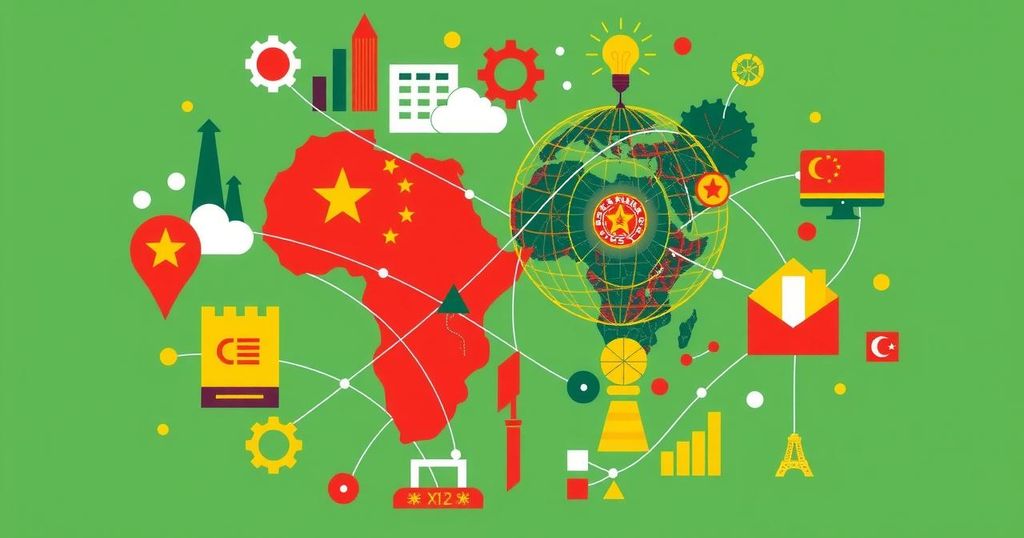China’s DeepSeek AI model has sparked optimism in Africa due to its affordability and open-source design, enabling local adaptation for various industries. With potential applications in agriculture and healthcare, it represents an opportunity for innovation across the continent. China’s cooperation with Africa through digital infrastructure development reinforces this progress, as both regions work together to bridge the digital divide and enhance economic growth through AI.
China’s AI model DeepSeek has garnered international attention due to its low cost, high performance, and open-source design. Its introduction in Africa has sparked lively discussions among media and industry insiders, who believe that artificial intelligence could catalyze innovation throughout the continent. DeepSeek’s potential includes aiding farmers with crop optimization and providing healthcare support in remote areas; these are not mere speculative scenarios, but possible realities that could arise from this technology.
According to the business magazine African Business, DeepSeek represents a cost-effective AI solution, raising optimism for addressing various social and economic challenges in Africa. Kennedy Chengeta, a South African AI entrepreneur, emphasized that DeepSeek’s affordability, coupled with its pre-trained models requiring less computing power, could dismantle barriers to AI adoption in Africa. This accessibility could empower small and medium-sized enterprises to craft innovative solutions that address local needs.
Historically, the AI market has been dominated by the United States and Western nations, often sidelining Global South regions, including Africa. However, DeepSeek’s emergence, as noted by Vellum Kenya, signifies that innovation in AI is not reserved for Silicon Valley. Furthermore, Techish reported that DeepSeek’s open-source framework fosters local adaptation, enabling developers to customize the technology to meet specific challenges in their regions, thus enhancing local innovation capabilities.
DeepSeek’s localized approach positions it to address inherent biases within AI systems, according to Techish. The African Gazette highlighted that China’s AI development uniquely focuses on localization, enabling applications such as agricultural assessments in Swahili or disease diagnosis in rural clinics. This inclusivity, they argue, is a pivotal aspect that appeals to vast markets in the Global South.
Africa is rapidly emerging as a key player in AI advancement, supported by its industrialization, urbanization, and a vibrant young demographic. While the continent currently holds only 2.5 percent of the global AI market, it is projected that AI could add approximately 2.9 trillion U.S. dollars to its economy by 2030. Organizations in Africa, including over 2,400 engaged in AI innovation, represent 41 percent of which are startups across various sectors such as healthcare and education.
Investments in AI-enabled startups across African nations reached 641 million dollars between 2022 and 2023. The establishment of AI strategies in countries like Algeria, Egypt, and Rwanda reflects a growing commitment to embrace AI across the continent. Kenya, South Africa, and Uganda are also integrating AI into broader technological frameworks, complementing initiatives related to the Fourth Industrial Revolution.
China’s collaboration with Africa has intensified, focusing on reducing the digital divide via the construction of digital infrastructure and talent development. Through initiatives like the Digital Silk Road, Chinese enterprises have significantly contributed to Africa’s digital landscape by building extensive power and telecommunications networks.
Since the inception of the Forum on China-Africa Cooperation, Chinese companies have played a pivotal role in constructing essential infrastructure, including new transmission lines and communication networks. AI solutions are now being applied to local industry growth in various African nations, with successful projects involving urban traffic management in Kenya and support for the fintech sector in South Africa. Such advancements demonstrate how AI applications can modernize traditional industries while improving governance in public services across Africa.
In summary, China’s AI model DeepSeek has the potential to revolutionize Africa by providing affordable and accessible solutions suited to local needs. Its open-source design fosters customization and innovation, addressing regional challenges and enabling economic growth. The partnership between China and Africa highlights a concerted effort to enhance digital infrastructure and promote talent development. As Africa continues to advance in AI, it is poised to significantly contribute to the global technological landscape, overcoming historical barriers and embracing a future of collaboration and growth.
Original Source: english.news.cn




